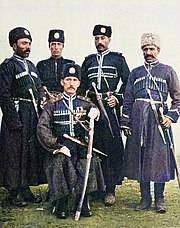
Back Carapapakhes AN Qarapapaqlar Azerbaijani قاراپاپاقلار AZB Ҡарапапахтар Bashkir Karapapak Catalan Карапапахаш CE قەرەپاپاک CKB Qarapapaqlar CRH Karapapaken German Καραπαπάκοι Greek
Qarapapaqlar, Karapapaklar | |
|---|---|
 Group of Karapapakh Hamidiyeh Cavalry, Ottoman Empire, 1901 | |
| Regions with significant populations | |
| |
| Languages | |
| Originally Karapapakh, nowadays mostly Azerbaijani, Turkish, Persian and Russian | |
| Religion | |
| Sunni Islam, Shia Islam and Ali-Illahism | |
| Related ethnic groups | |
| Other Turkic peoples Especially Azerbaijanis and Turks |
The Karapapakhs (Azerbaijani: Qarapapaqlar; Turkish: Karapapaklar), or Terekeme[2] (Azerbaijani: Tərəkəmələr; Turkish: Terekemeler), are a Turkic people, who originally spoke the Karapapakh language, a western Oghuz language closely related to Azerbaijani and Turkish. Nowadays, the Karapapakh language has been largely supplanted by Azerbaijani and Turkish.
After moving into Western Asia in the Middle Ages together with other Turkic speakers and Mongol nomads, the Karapapakhs settled along the Debed river in eastern Georgia (along the present-day Georgian-Armenian border). They moved to Qajar Iran, and the Ottoman Empire after the Treaty of Turkmenchay was concluded between Iran and Russia in 1828. The Karapapakhs who remained within the Russian Empire were counted as a separate group in Tsarist population figures. During the Soviet Union's existence, the Karapapakhs were culturally and linguistically assimilated by the Azerbaijanis, and they were counted as "Azerbaijanis" in the 1959 and 1970 Soviet censuses. In 1944 the Karapapakh in the Soviet Union were deported en masse to Soviet Central Asia.
The Karapapakhs have traditionally been Sunnis, Shias, and adherents of Ali-Illahism. According to the latest western ethnographic works that primarily dealt with the ethnography of the Soviet Union, most Karapapakhs in the 1980s lived in Turkey, Iran, Soviet Central Asia (primarily the Uzbek SSR) and the Soviet republics of the Caucasus (primarily the Georgian SSR and the Armenian SSR).
- ^ Türkoğlu, İsmail (2001). "Karapapaklar". İslâm Ansiklopedisi. Türkiye Diyanet Vakfı. Vol. 24. p. 470. (in Turkish).
- ^ Ercilâsun, Ahmet Bican (1983). Kars ili ağızları: ses bilgisi (in Turkish). p. 44.
© MMXXIII Rich X Search. We shall prevail. All rights reserved. Rich X Search